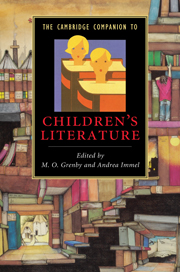8 - Learning to be literate
from Part II - Audiences
Published online by Cambridge University Press: 28 November 2010
Summary
In all of children's literature, the character with the surest sense of the vital importance of being literate is the spider Charlotte from E. B. White's classic 1952 novel, Charlotte's Web. Charlotte knows, as does everyone else on the farm, that pigs like her friend Wilbur are slated from birth for violent, unnatural deaths. In order to save his life Charlotte must take heroic measures. Her plan of attack? A war of words.
In the context of the life-and-death seriousness of the situation, it may seem odd that the first words Charlotte chooses to write in her web, 'Some Pig', are colloquial, rural, grammatically dubious and puzzling. Yet the phrase invites speculation. After reading Charlotte's carefully woven sign, the likely wielders of the knife, the farmer Zuckerman and his henchman Lurvy, discuss their pig seriously. They try to figure out why Wilbur is not just any old pig. They wonder what makes him 'Some Pig'. That's what saves him. If, instead of 'Some Pig', Charlotte had written the clichéd commandment 'Thou Shalt Not Kill' into her web, would it have had the same effect? Not likely.
In using her words to save Wilbur from the Christmas slaughter, Charlotte participates in the historical tradition that equates reading with intellectual accomplishment and the ability to save a life. In early modern Britain, convicted felons sentenced to death by hanging could claim what was called 'benefit of the clergy'. If they could read 'the neck verse', the beginning of Psalm 51, they would be reprieved.
- Type
- Chapter
- Information
- The Cambridge Companion to Children's Literature , pp. 127 - 142Publisher: Cambridge University PressPrint publication year: 2009
- 1
- Cited by

